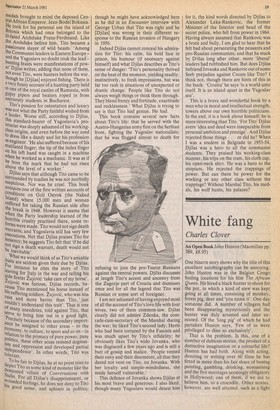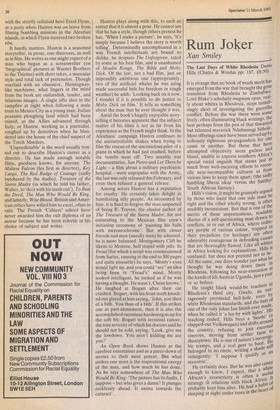White fang
Charles Clover
An Open Book John Huston (Macmillan pp. 389, £8.95) One bizarre story shows why the title of this excellent autobiography can be annoying. John Huston was in the Belgian Congo finding locations for his film The African Queen. He hired a black hunter to shoot for the pot, in which a kind of stew was kept going at all times, consisting of monkey, forest pig, deer and 'you name it'. One day someone did. A number of villagers had been disappearing mysteriously and the hunter was duly arrested and later executed. Of the 'long pig' of which he had partaken Huston says, 'Few of us were privileged to dine so exclusively'.
That is the problem. Is this, one of a number of dubious stories, the product of a distinctive imagination or a colourful life? Huston has had both. Along with acting, directing or writing over 60 films he has fitted in more than his fair share of boxing painting, gambling, drinking, womanising and the five marriages seemingly obligatory in Hollywood; one of them, if we are to believe him, to a crocodile. Other stories, however, are well attested, such as a fight with the strictly celluloid hero Errol Flynn, at a party when Huston was on leave from filming bombing missions in the Aleutian islands, in which Flynn received two broken ribs.
It hardly matters. Huston is a seasoned storyteller, in prose, one discovers, as well as in film. He writes as one might expect of a man who began as a screenwriter (on 'biographical' pictures at Warner Brothers in the Thirties) with short takes, a muscular style and total lack of pretension. Though overlaid with an obsessive, Hemingwaylike machismo, what lingers in the mind from the book are outlandish, tender, and hilarious images. A single rifle shot in the campfire at night when following a mule train to Mexico City as a young man; Italian peasants ploughing land which had been mined, as the Allies advanced through Italy; or Huston, working as a journalist, roughed up by detectives when he blundered into the house of the chief suspect of the Torch Murders.
'Unpredictable' is the word usually trotted out to describe Huston's career as a director. He has made enough notable films, goodness knows, for anyone: The Maltese Falcon (his first as director), Key Largo, The Red Badge of Courage (sadly butchered by the studio), Treasure of the Sierra Madre (in which he told his father, Walter, to `do it with his teeth out'), To Beat the Devil, The Man Who Would Be King, and latterly, Wise Blood. British and American critics have willed him to excel, often in vain. The French 'Cahiers' school have never awarded him the cult diploma of art auteur because he has been eclectic in his choice of subject and writer. Huston plays along with this, to such an extent that it is almost a pose. He cannot see that he has a style, though others protest he ' has. 'When I make a picture', he says, 'it's simply because I believe the story is worth telling'. Determinedly uncomplicated in a way French intellectuals are bound to dislike, he despises The Unforgiven, rated by some as his best film, and is unashamed of Moulin Rouge, The Bible and Moby Dick. Of the last, not a bad film, just an impossibly ambitious one (appropriately, two of the artificial whales he was using made successful bids for freedom in rough weather) he adds: 'Looking back on it now, I wonder if it is possible to do justice to Moby Dick on film.' It tells us something about the man that he ever thought it was.
Amid the book's hugely enjoyable storytelling it becomes apparent that the subject matter of his films is not as far from his experience as the French might think. In the Aleutians' campaign Huston confesses to the uncontrollable shakes when trying to film the rescue of the unconscious pilot of a plane in which he had just crashed, before the bombs went off. Two notable war documentaries, San Pietro and Let There be Light — a film about a military psychiatric hospital — were unpopular with the Army, the last was only released this February, and even then refused a general release.
Among actors Huston has a reputation for cruelty. He certainly takes delight in humiliating silly people. As recounted by him, it is hard to forgive the man suspected of being B. Traven, the elusive author of The Treasure of the Sierra Madre, for not consenting to the Mexican film crew's initiation ceremony of 'painting his balls with mercurochrome'. But with closer friends and men (usually men) he admired, he is more balanced. Montgomery Clift he likens to Monroe, half stupid with pills. In Freud (for which a script was commissioned from Sartre, running in the end to 300 pages and quite unusable) he says, `Monty's eyes would light up, and you could "see" an idea being born in "Freud's" mind. Monty looked intelligent, he looked as if he was having a thought. He wasn't, Christ knows.' He laughed at Bogart after their car crashed. Bogart, with his front teeth knocked out glared at him saying, 'John, you thun of a bith. You thun of a bith'. If this strikes one as part-atonement, then it is also the accomplished raconteur hardening us up for the soft bit: Bogart with terminal cancer, the true severity of which his doctors said he should not be told, saying, 'Look, give me the lowdown. You aren't kidding me are you?'
An Open Book shows Huston as the carefree entertainer and as a parer-down of stories to their most potent. But what strikes one most is the inspirational energy of the man, and how much he has done. As he says somewhere of The Man Who Would Be King: 'The picture has its faults, I suppose — but who gives a damn? It plunges recklessly ahead. It swims towards the cataract'.







































 Previous page
Previous page